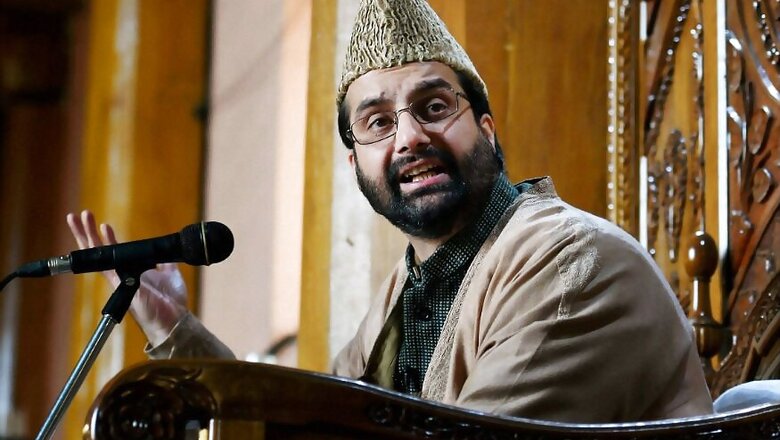
views
Kashmir is on the boil once again. Many are comparing Kashmir of 2017 with that of early 1990s when militancy broke out. And Mirwaiz Umar Farooq, one of the senior-most leaders of the All Parties’ Hurriyat Conference, is one of those who make that parallel.
In an interview with News18, Farooq says Kashmir is not demanding roads and tunnels as being offered by New Delhi. Blaming Prime Minister Narendra Modi of doing a “complete U-turn” on Atal Bihari Vajpayee’s approach of “humanity first”, Farooq says New Delhi is pushing things so hard that Hurriyat leadership may call for Kashmiris to occupy the streets. Edited excerpts:A lot of people say that the Hurriyat isn’t relevant in Kashmir anymore. How would you respond to this?
This is why the government of India has put Hurriyat leaders under detention. I have been in house arrest for the past 46 days. Same is the case with Syed Ali Shah Geelani and Yaseen Malik. It suits some agencies and government of India to give an impression that Hurriyat has no control over what is happening in Kashmir, but that is not the truth.How do you react to BJP general secretary Ram Madhav’s statement about all being fair in love and war?
It seems that India considers itself to be at war with the people of Kashmir. The import of the message that Ram Madhav has given, has not been lost on the people of Kashmir. It clearly suggests what sort of policy and approach New Delhi is adopting towards the people of Kashmir.Congress has just constituted a policy planning group on Kashmir headed by former prime minister Manmohan Singh. There are some talks about this delegation visiting Kashmir along with party vice-president Rahul Gandhi. Will you interact with this group?
We have not been approached by them. But anybody is welcome. From our point of view, things are very clear. It’s an open book and one that’s not difficult to read.
Everyone here wants a solution to the Kashmir issue. Militarisation should end, black laws like Armed Forces Special Powers Act (AFSPA) should go, political arrests and detentions should stop. Bullets and pellets should not be used. But we will also ask any such delegation to urge the government to allow peaceful expression of dissent. People should be given space to express their dissent, to propagate their point of view peacefully.
At the moment, no space is given to young people to express their views. There is no concept of student politics, they don’t allow students to hold peaceful rallies, they don’t allow students to form unions. Even discussions or debates aren’t allowed in colleges.
When you don’t let people talk and discuss and vent their sentiments, the only means for people to express themselves is through stones.Has anyone from the Centre approached you for talks? Is there any back-channel talk happening right now?
No. There has been absolutely no initiative (from New Delhi) taken at any level. The only initiative that was taken was by Yashwant Sinha. And it was made clear that it was his own personal initiative.What differences do you notice in New Delhi’s approach towards Kashmir during Prime Minister Narendra Modi’s tenure and the Centre led by Atal Bihari Vajpayee?
Vajpayee made an effort to reach out to everyone, not just in Kashmir, not just with the Hurriyat, but with Pakistan also. There was a triangular approach. India was talking to Hurriyat and Pakistan while also allowing us to travel to Pakistan. During Vajpayee’s tenure, there was a process of engagement among all the stakeholders.
And I think the most important aspect of the way he approached Kashmir, was the novel manner in which, when the Hurriyat said it did not want to talk within the ambit of Constitution, he said we are going to talk within the ambit of humanity. He did not set any preconditions to dialogue. We felt that was the approach that made a breakthrough.
But when Modi came to power, he completely did a U-turn on that. Vajpayee’s policy seems to have been buried by Modi government. Modi has come to Kashmir, twice or thrice since assuming power, but never on his visit to Kashmir did he talk about the political problem. All he talked about was roads and tunnels.
But Kashmir is not suffering from an administrative problem. We are not out on roads demanding bijli, sadak, paani.How different is today’s Kashmir from the Kashmir of early ’90s?
In ’90s there was anger, emotions, sentiments. In 2017, there is absolute hate.A lot of people have talked about out-of-box solutions for restoring peace in Kashmir. What could such a solution be?
As far as I can see, there are two ways to approach the Kashmir issue. Either you go back to UN resolutions, or try and reach a settlement through dialogue with the people of Kashmir and Pakistan.
The latter is exactly what was being done at the time of Vajpayee, when all the three parties were talking. Yes, the solution was still a long way, but what was visible was the process and we need to have a process.
Whether you are talking about the Musharraf formula, the four-point solution, whether you talk about demilitarised zones, open borders, self-governance, there are a lot of options. But situations conducive to discussing them have to be created first.The senior-most Hurriyat leader Geelani is quite old and unwell. There is speculation about who will lead Hurriyat after him? Will there be chaos in the Hurriyat after Geelani?
Why are we talking about his death? This is a very wrong notion. This is not how policies are made. You do not wait for someone to die. This approach speaks about complete bankruptcy in terms of approach towards the Kashmir issue.
The fact is that whether it is Geelani sahab or Yaseen Malik, everyone is on the same page. No one is against dialogue. But there has to be some seriousness on New Delhi’s part. Some of their leaders say the issue is with Pakistan-held Kashmir, not this (side of) Kashmir. They seem to be very confused. Let us be clear. When we talk about Kashmir, we talk about the state of J&K as it existed on paper on August 14, 1947.How bad is the situation on the ground? And where do we go from here?
Things have already gone very bad. Already we are in a war-like situation. We have to be prepared for the worst. Maybe this will lead to a situation where people will say that everybody will have to come out on the roads and not go back till a solution is arrived at.

















Comments
0 comment